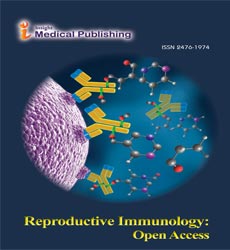Abstract
Early Diagnosis of Interstitial Pregnancy Associated to Assisted Reproductive Techniques Case Report
Background: 2.4% of ectopic pregnancies develop in the interstitial portion of the fallopian tube and is associated over to a 2.5% mortality rate, in contrast to other forms of tubal ectopic pregnancy with a lower mortality rate.
Case Report: A patient with a 5 years history of primary infertility and severe endometriosis undergoes an in vitro fertilization (IVF) after pituitary suppression. Embryos were transferred and a month afterward, ultrasonography examination reported an 18 mm gestational sac, with an embryo in the left adnexal mass. However, an empty uterine cavity is reported in spite of an elevated human chorionic gonadotropin beta fraction. Because of this a diagnostic/ operative laparoscopy is performed. The histopathology result reports a left interstitial ectopic pregnancy. The patient progresses through an uneventful postoperative period, and is checked-out the next day in proper clinical status.
Conclusion: Ectopic pregnancy is a complication of assisted reproduction techniques and interstitial pregnancy is a rare form of tubal pregnancy posing a diagnostic challenge and a life-threatening condition due to the risk of massive bleeding. Hence, clinical suspicion of an interstitial pregnancy requires a quick intervention to avoid a potentially life-threatening situation.
Author(s):
Mercedes del Pilar Alvarez-Goris and Abraham Zavala-Garcia
Abstract | Full-Text | PDF
Share this

Google scholar citation report
Citations : 237
Reproductive Immunology: Open Access received 237 citations as per google scholar report
Abstracted/Indexed in
- Google Scholar
- Sherpa Romeo
- China National Knowledge Infrastructure (CNKI)
- Secret Search Engine Labs
Open Access Journals
- Aquaculture & Veterinary Science
- Chemistry & Chemical Sciences
- Clinical Sciences
- Engineering
- General Science
- Genetics & Molecular Biology
- Health Care & Nursing
- Immunology & Microbiology
- Materials Science
- Mathematics & Physics
- Medical Sciences
- Neurology & Psychiatry
- Oncology & Cancer Science
- Pharmaceutical Sciences

